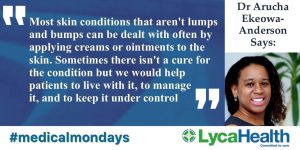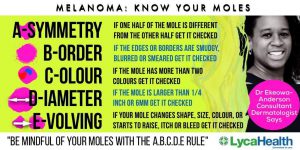19.05.2017
On Monday 15th May LycaHealth’s Dermatologist Dr Arucha Ekeowa- Anderson spoke with Dil Se Radio Presenter Deep Rajah about skin protection and skin care during hot weather for adults and children, more specifically focused on the importance of checking your moles.
Dr Arucha Ekeowa-Anderson graduated in medicine in 1997 from Guy’s & St. Thomas’ Hospitals, University of London. She secured Membership of the Royal College of Physicians in 2000 and entered Dermatology training in Oxford and Amersham. Her Dermatology specialist training was completed in the Hammersmith and The Royal London Hospital rotations and she is experienced in assessing and managing skin disease in adults and children across the range of skin types. Dr Ekeowa-Anderson was appointed Consultant Dermatologist to Whipps Cross University Hospital, Barts Health NHS Trust in 2010 where she treats all skin, hair and nail disease including skin cancer.
“I have been a Consultant Dermatologist for over five years. I trained in West, North and East London and have expertise in assessing and treating skin conditions in all ethnic skin type. I have expertise in vulval dermatology, having lead the multi-specialty service at Chelsea & Westminster NHS Foundation Trust.”
Dr Ekeowa-Anderson developed sub-specialty experience in genital dermatology of women and men at Chelsea & Westminster NHS Foundation trust. Whilst there she led the multi-specialty weekly clinic working closely with gynaecologists, genitourinary medicine physicians, psychologists and women’s health physiotherapists. She is a fellow of the International Society for the study of Vulvovaginal disease and has published research work in vulval disease.
“I have clinical and research interest in vulval dermatology and have presented work nationally and internationally. I undertook a fellowship in training in female and male genital dermatology. Following this I led a large teaching hospital vulval service, working with gynaecologists, Genitourinary medicine physicians and Women’s Health physiotherapists.”
The interview started with her brief explanation of a dermatologists role:
“We are specialists that deal with skin disease. Any kind of skin disease from skin cancer to inflammation of the skin, that might be eczema or colour changes in the skin. And we deal with some things that come out of the skin so hair disorders and nail problems. The skin is the largest organ of the body so there’s a real varied range of conditions and diseases that we deal with.”

“Most skin conditions which aren’t lumps and bumps on the skin, can be dealt often by applying creams or ointments to the skin. Sometimes there isn’t a cure for the condition, but we would help patients to live with it, to manage it, and to keep it under control.”
She went on to explain that:
“Much of my practice is based in east London so we see a diverse range of different skin types. There are some conditions that might be more common in black or Asian skin for example, but often a condition could affect a whole range of skin types but have slightly different ways that it might look and slightly different ways it might affect that patient. Eczema is common in all skin types but in black and brown skin can cause more colour change that it might do for white skin for example.”
Education is important – Dr Ekeowa- Anderson stated that she often sees a number of fair skinned patients who have had a lot of sun exposure and say, they were not aware as children or young adults that if they were sitting in the sun and developed a sun burn that it would give them problems later on. On one end of the scale the idea of a tan through sunbathing or through the use of sunbeds is appealing, and then on other end you have some groups using bleaching agents on their skin to lighten their skin, these can often cause difficulties with the skin later on.
“Sun protection at this time of year is a message that we are giving to a lot of our patients. It’s not just white skin that needs sun protection, in midday even in this country, the rays of the sun can be harmful. Being safe and following sun screen advice, staying in the shade particularly when it’s a hot sunny day and being aware of changing moles is key”
Melanoma is a type of skin cancer that can spread to the other organs in the body. It is imperative to keep an eye on any moles that may appear on your body.
It is important to be mindful of your moles with the A.B.C.D.E rule. Here are some tips on how to check and track moles, and the red flags that alert you to get them seen by a specialist.

A for ASYMMETRY- if one half of the mole is different from the other half
B for BORDER- if the edges or borders are smudgy, blurred or smeared
C for COLOUR- if the mole has more than two colours
D for DIAMETER- if the mole is larger than ¼ inch or 6mm
E for EVOLVING- if your mole changes shape, size, colour, or starts to raise, itch or bleed
Dr Arucha’s take home message was this:
“If you discover a mole on your back, or anywhere else on your body that is hard to see without assistance, please ask for support from a loved one or friend. Look out for the signals, if you notice any of the above get it checked. It’s better to be safe, the sooner melanoma is caught the better chance you will have for treatment.
Dr Arucha Ekeowa- Anderson practices at LycaHealth Canary Wharf, she runs a regular clinic on a Monday and Thursday, and is available adhoc by appointment.
If you would like to book an appointment with Dr Ekeowa- Anderson please visit: www.lycahealth.com or call 0207 132 1440.
Stay up to date
To request information on any of our other services, please call or complete the enquiry form below: